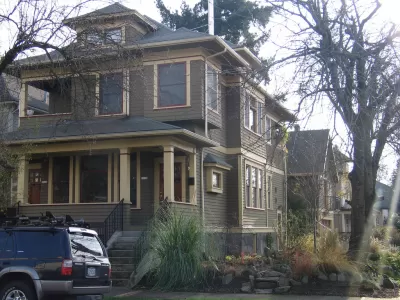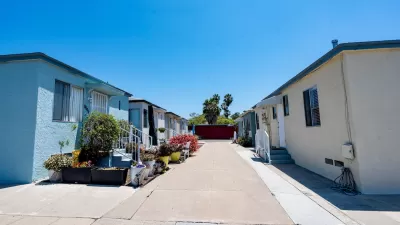Prospect Newtown, in Longmont, CO, has seamlessly integrated affordable housing by creating a host of accessory dwelling units (ADUs). The ADUs are perfectly blended within the town overall—and actually help contribute to the development’s success.

Set on the 80-acre site of his family’s former tree farm only a 10-minute drive from Boulder, Prospect Newtown was conceived of by developer Kiki Wallace in the mid-1990s. Attracted to New Urbanism’s tenets of walkable, livable communities, Wallace decided to create a development based on these ideals.
Wallace hired renown New Urbanist architects Duany Plater-Zyberk (DPZ) to carry out his vision. Over the last twenty years, and throughout multiple building phases, Prospect has become a thriving new kind of suburban community. Kids run along sidewalks on narrow tree-lined streets, a town center beckons locals with shops, restaurants, and offices, along with a community park, and a mix of home types—including townhomes, detached houses, live/work spaces, and lofts above retail—attract residents with a variety of architectural styles.
ADUs are a vital component of this plan. Originally, city ordinances required that 10% of new housing needed to be affordable, with no specifics to how this should be done. As a result, Wallace and DPZ decided that ADUs would fill this role. Set above detached garages or behind homes, and generally around 500-650 square feet, these units rent for around $1,000 and are eminently popular with renters and homeowners alike. “By virtue of their location, they act as naturally occurring affordable housing,” says Wallace. “There’s no need to mandate or regulate them.” There are currently around 325 townhomes, condos, lofts, and houses in Prospect—and some 150 additional ADUs.
First and foremost, the planners knew that ADUs had to appeal to homeowners to make them successful. To ensure that “homeowners don’t feel threatened and that renters have privacy” as Wallace describes, thoughtful design included creating separate entrances, making sure that ADUs’ windows didn’t look into the backyard, and placing them behind homes so they feel distinct from the main residence. Though initially the first owners of ADUs all said they wouldn’t rent them out, within six months, all of the first ADUs were completely rented since as Wallace says, “There’s no invasion of privacy, and they bring in subsidies for the landlord.”
FULL STORY: Prospect's Affordable Accessory Dwelling Units

Planetizen Federal Action Tracker
A weekly monitor of how Trump’s orders and actions are impacting planners and planning in America.

Congressman Proposes Bill to Rename DC Metro “Trump Train”
The Make Autorail Great Again Act would withhold federal funding to the system until the Washington Metropolitan Area Transit Authority (WMATA), rebrands as the Washington Metropolitan Authority for Greater Access (WMAGA).

The Simple Legislative Tool Transforming Vacant Downtowns
In California, Michigan and Georgia, an easy win is bringing dollars — and delight — back to city centers.

The States Losing Rural Delivery Rooms at an Alarming Pace
In some states, as few as 9% of rural hospitals still deliver babies. As a result, rising pre-term births, no adequate pre-term care and "harrowing" close calls are a growing reality.

The Small South Asian Republic Going all in on EVs
Thanks to one simple policy change less than five years ago, 65% of new cars in this Himalayan country are now electric.

DC Backpedals on Bike Lane Protection, Swaps Barriers for Paint
Citing aesthetic concerns, the city is removing the concrete barriers and flexposts that once separated Arizona Avenue cyclists from motor vehicles.
Urban Design for Planners 1: Software Tools
This six-course series explores essential urban design concepts using open source software and equips planners with the tools they need to participate fully in the urban design process.
Planning for Universal Design
Learn the tools for implementing Universal Design in planning regulations.
Smith Gee Studio
City of Charlotte
City of Camden Redevelopment Agency
City of Astoria
Transportation Research & Education Center (TREC) at Portland State University
US High Speed Rail Association
City of Camden Redevelopment Agency
Municipality of Princeton (NJ)




























